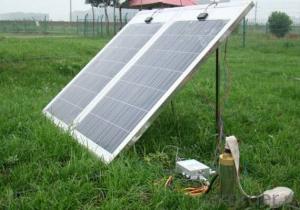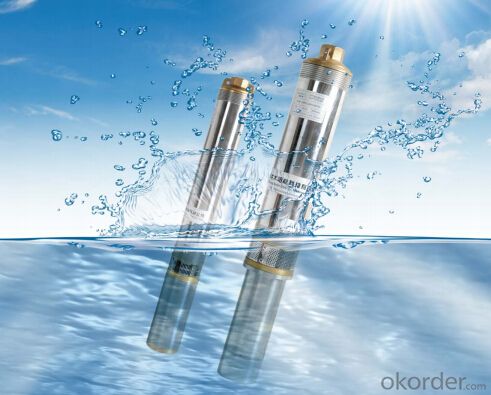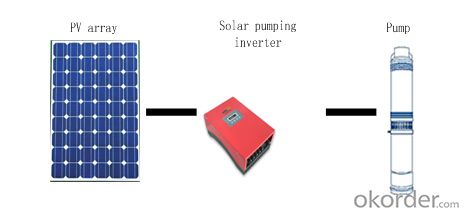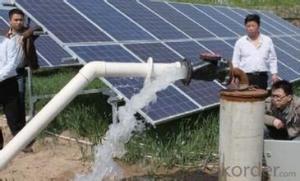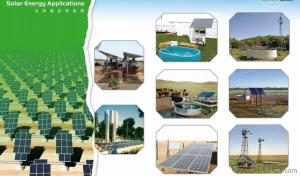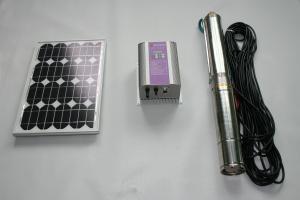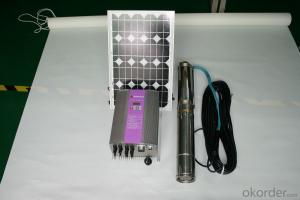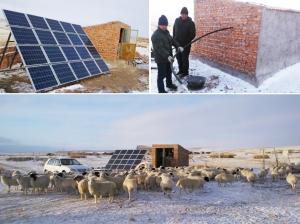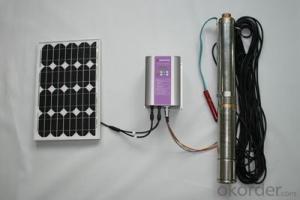Solar Pump for Water:0.1kw-37kw System Design / Helen
- Loading Port:
- Shanghai
- Payment Terms:
- TT OR LC
- Min Order Qty:
- 10 pc
- Supply Capability:
- 1000 pc/month
OKorder Service Pledge
OKorder Financial Service
You Might Also Like
The photovoltaic pumping system is different from the traditional AC pumping system , and the photovoltaic pumping system utilizes solar cells convert solar energy into electric energy , then the photovoltaic pumping inverter drives ac motor for the pump running , and pumping up water from water well , river , lake etc areas and then transport to the destination to satisfy our requests for the water demand .
Photovoltaic arrays adopts solar radiation energy to convert it to electric power ,providing the motive power for the whole system . And the function of the solar pumping inverter is converting the DC power output from PV array to AC power to drive the pump to finalize the water pumping up as well as adjusting the output power real-timely according to the change of sunlight intensity , in this way , the system realizes the max power point tracking and the solar energy can be utilized furthest
The whole system solves the water pumping up requests perfectly , omitting the battery bank and charge controller etc equipments , so it is very economical and environmental . Since they are with the merits of low carbon , energy conversation , environmental protection etc , so they have a broad market foreground and great social value
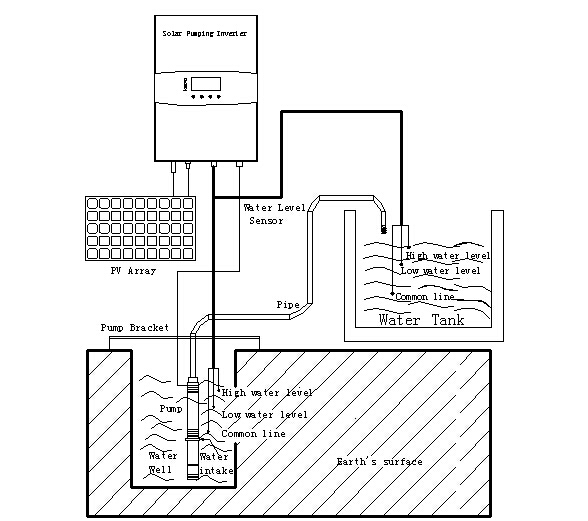
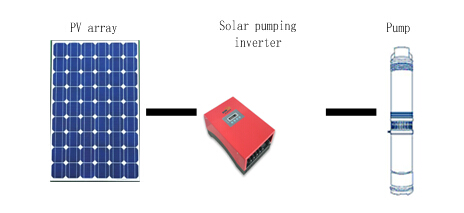
2.2 Application
Agricultural irrigation
Desert manage
Domestic water
Grassland animal husbandry
city waterscape
Island water supply
Landscape and fountain system of municipal engineering , city square , hotels and residence community
2.3 About product
This product is using a high performance digital signal processing chip, can provide solution for solar water pumpingsystem with high cost performance. Solar pumping system as a whole block diagram as shown in 2.
SHP series inverter has the following features:
a. True max power tracking technology (TMPPT) with our own intellectual property; effectively improve the use ratio of PV array. The stable tracking efficiency can reach 99.2% , Solving the problem of bad tracking efficiency and running unstability under the situation of sunlight intensity quick change when comparing with the traditional MPPT method .
b. Adopt efficient IPM power module from Mitsubishi Company with high reliability.
c. With the function of high and low water level detection , high safety factor.
d. Automatic anti-drying protection function , with multi-protection for motor
e. Multi-language LCD display , easy for operation , very user-friendly
f. The independent developed principal computer with our own intellectual properties , remote monitoring is available
g. Modular design , direct plug-in terminal , good-looking appearance, easy for installation , operation and maintenance .
h. Suitable for the pump adopted three phase asynchronous motor
i. Complete digital control , with the function of full automatic running and data storage .
j. Perfect protection system , with the protection function for lighting , over voltage , under voltage , short circuit , over loads , water drain off , low sunlight , over heating etc ,
k. Adopt the complete radiating system , so radiating efficiency is better and the service life is longer
l. Through strict environmental test , adapt the rigorous environment :-10℃~+50℃
m.No impacted mains supply power switch function (optional ), All-weather running available
n. Through strict environmental test , adapt the rigorous environment :-10℃~+50℃
1. How long will my inquiry get response?
Your inquiry related to our products or prices will be replied within 24 hours.
2. Can I get professional service and suggestion?
Well-trained and experienced staffs to answer all your questions in fluent English.
3. Do you accept OEM or customized design?
OEM & ODM, any your customized lightings we can help you to design and put into product.
4. What if I need specific design?
Distributorship are offered for your unique design and some our current models.
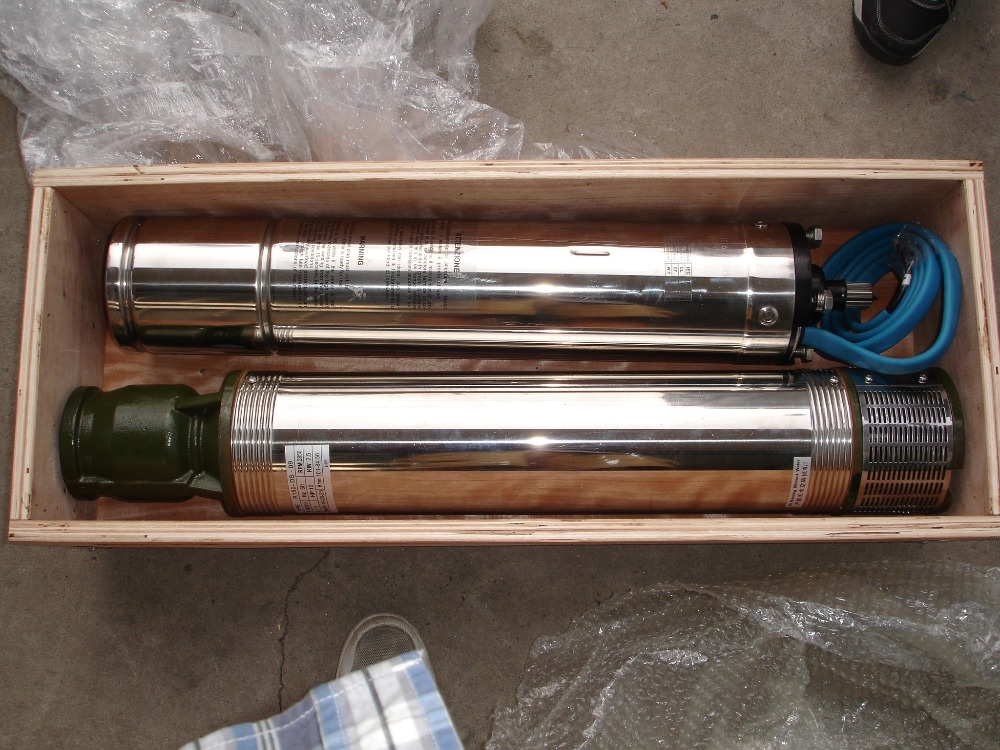
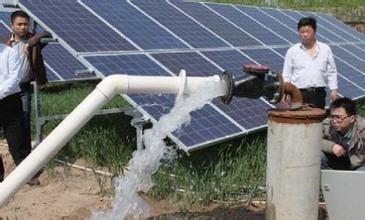
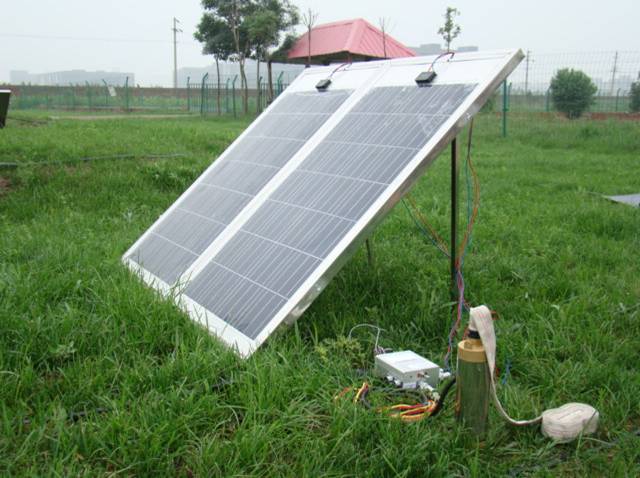
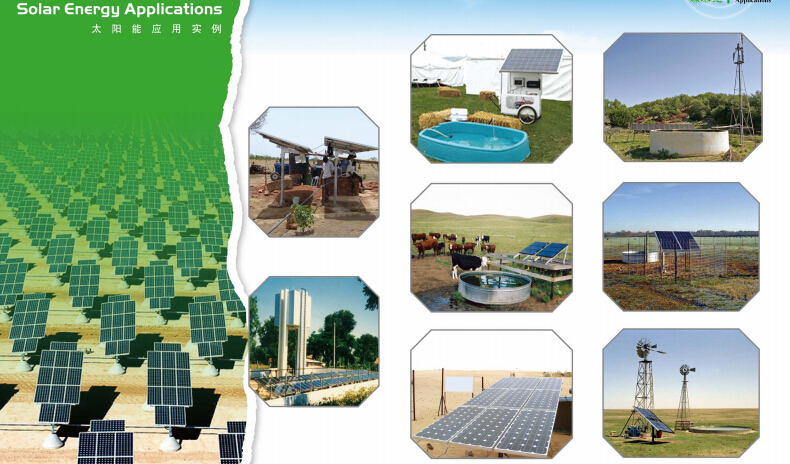
- Q: Can a solar pump be used in combination with a drip irrigation system?
- A solar pump is capable of being utilized alongside a drip irrigation system. In reality, opting for a solar pump can prove to be an economical and energy-conserving choice when it comes to powering a drip irrigation system. Solar pumps operate by converting sunlight into electricity through photovoltaic panels, which is then utilized to power the pump. This eradicates the necessity for grid electricity or generators that rely on fuel, thus making it a sustainable and environmentally-friendly option. Drip irrigation systems are specifically designed to supply water directly to plant roots at a slow and regulated pace, thereby minimizing water wastage and evaporation. By combining a solar pump with a drip irrigation system, farmers and gardeners can ensure proper water distribution to crops at the appropriate time, while simultaneously reducing water consumption and optimizing plant growth. Solar pumps can be adjusted to meet the precise water requirements of a drip irrigation system, allowing for accurate control over water flow and delivery. Additionally, they can be equipped with sensors and controllers to automate the irrigation process, further enhancing efficiency and reducing manual labor. Moreover, utilizing a solar pump for drip irrigation can prove to be particularly advantageous in regions with limited or unreliable access to electricity. The sun is an abundant and cost-free source of energy, rendering solar pumps a feasible solution for remote or off-grid locations. In conclusion, a solar pump unquestionably has the potential to be utilized in conjunction with a drip irrigation system, offering a sustainable, cost-effective, and efficient means of watering crops and plants.
- Q: What is the maximum depth at which a solar pump can extract water?
- The maximum depth at which a solar pump can extract water depends on various factors such as the power of the solar panels, the efficiency of the pump, the capacity of the pump, and the conditions of the well or water source. Generally, solar pumps can extract water from depths ranging from 100 to 500 feet (30 to 150 meters) or even deeper. However, it is important to note that as the depth increases, the efficiency of the pump may decrease, and additional equipment or stronger solar panels may be required to overcome the increased resistance. Consulting with a professional or the manufacturer of the solar pump would provide more specific information regarding the maximum depth capabilities of a particular model.
- Q: Are solar pumps suitable for use in golf courses?
- Yes, solar pumps are suitable for use in golf courses. They provide a cost-effective and environmentally friendly solution for irrigation needs, helping to maintain the lushness and beauty of the golf course while reducing energy costs and carbon emissions. Additionally, solar pumps are low maintenance and can operate efficiently even in remote areas, making them a practical choice for golf course irrigation systems.
- Q: How does a solar pump handle water with high levels of color or turbidity?
- A solar pump can handle water with high levels of color or turbidity by using a filtration system. The pump is equipped with filters that remove particles, sediments, and impurities from the water before it is pumped out. This ensures that the water extracted is clean and suitable for various applications, such as irrigation or drinking purposes.
- Q: Can a solar pump be used for desalination?
- Indeed, desalination can utilize a solar pump. Desalination refers to the elimination of salt and other impurities from seawater, rendering it suitable for consumption or irrigation. Solar pumps function on solar energy, presenting a sustainable and environmentally friendly choice for desalination endeavors. These pumps can extract water from the ocean or any other source and deliver it to a desalination facility, where the water undergoes treatment and purification. By providing the necessary energy, solar pumps diminish the dependence on fossil fuels and minimize the carbon footprint associated with desalination projects. Moreover, the utilization of solar pumps in desalination can enhance the feasibility and cost-effectiveness of implementing such initiatives in remote or off-grid areas with limited access to electricity. In summary, solar pumps offer a practical and sustainable resolution for powering desalination procedures.
- Q: How much energy does a solar pump consume?
- Energy from the sun is consumed by a solar pump, which is then converted into electricity using photovoltaic cells. The consumption of energy by a solar pump is influenced by factors such as the pump's size and efficiency, the amount of sunlight available, and the water needs. For garden irrigation or small-scale water pumping, a small solar pump typically utilizes 100 to 1000 watts of power. These pumps are designed to maximize energy efficiency and rely on direct sunlight for optimal operation. In contrast, larger solar pumps used for agricultural or commercial purposes require more energy. Their power consumption can range from a few kilowatts to several hundred kilowatts, depending on the size of the installation and the water demand. It is important to note that the energy consumption of a solar pump varies based on the specific circumstances and requirements of the application. However, solar pumps are generally regarded as highly efficient and environmentally friendly because they utilize renewable energy from the sun, reducing dependence on traditional electricity sources.
- Q: Can a solar pump be used for hydroponic farming?
- Yes, a solar pump can be used for hydroponic farming. Solar pumps are an efficient and environmentally friendly option for providing water circulation in hydroponic systems. They can be used to deliver nutrient solutions to the plants' roots, ensuring proper hydration and nutrient uptake without relying on traditional electricity sources.
- Q: What is the expected maintenance schedule for a solar pump?
- The maintenance schedule for a solar pump can vary depending on factors such as the pump's type and model, the quality of its components, the environmental conditions it operates in, and how much it is used. However, in general, a solar pump requires less maintenance than traditional pumps because of its simple design and reliance on renewable energy. To keep a solar pump in good condition, it is important to regularly perform the following tasks: 1. Keep the solar panels clean: To ensure the pump absorbs sunlight efficiently, it is necessary to clean the panels regularly, removing dust, dirt, and debris. A soft cloth or sponge and mild detergent should be used for cleaning, avoiding any abrasive materials that could scratch the surface. 2. Inspect the wiring and connections: It is important to periodically check the electrical wiring and connections to ensure they are secure and free from wear or damage. Loose or faulty connections can lead to reduced performance or system failure. 3. Monitor water levels: Depending on the type of solar pump and its application, it may be necessary to regularly check the water levels. This is especially important for pumps used in irrigation systems or remote water supply, as low water levels can cause the pump to overheat or run dry, potentially damaging the motor or pump components. 4. Lubricate moving parts: Some solar pumps may require occasional lubrication of moving parts, such as bearings or seals, to prevent friction and ensure smooth operation. It is essential to use the recommended lubricant and follow the manufacturer's guidelines for proper application. 5. Maintain the batteries: For solar pumps with battery backup systems, it is crucial to monitor and maintain the batteries. This includes checking the charge level, cleaning the battery terminals, and replacing batteries if necessary. Proper battery maintenance is essential for consistent pump performance, especially during periods of low sunlight or at night. 6. Seek professional servicing: While routine maintenance can be done by the user, it is advisable to have a professional service the solar pump periodically. This allows for a thorough inspection, testing of system components, and identification of any potential issues that may require attention. It is important to note that the manufacturer may provide specific maintenance requirements in the user manual or documentation. Following the recommended maintenance schedule and guidelines provided by the manufacturer will ensure optimal performance and longevity of the solar pump.
- Q: Can a solar pump be used for water supply in off-grid wineries?
- Certainly! Off-grid wineries can utilize solar pumps for water supply. Solar pumps are frequently employed in locations without access to electricity. By harnessing solar energy, these pumps are able to function, providing an environmentally friendly and economical solution for water supply. Whether it be drawing water from wells, rivers, or alternative sources, solar pumps effectively distribute water to wineries for irrigation and other requirements. Their straightforward installation process and low maintenance demands make them a practical option for off-grid wineries seeking sustainable water supply solutions.
- Q: How does the cost of operating a solar pump compare to a traditional electric pump?
- The cost of operating a solar pump is generally lower than that of a traditional electric pump. Solar pumps utilize energy from the sun, which is free and renewable, to power the pump, resulting in significant savings on electricity bills. Additionally, solar pumps require less maintenance and have a longer lifespan compared to electric pumps, further reducing operating costs in the long run.
Send your message to us
Solar Pump for Water:0.1kw-37kw System Design / Helen
- Loading Port:
- Shanghai
- Payment Terms:
- TT OR LC
- Min Order Qty:
- 10 pc
- Supply Capability:
- 1000 pc/month
OKorder Service Pledge
OKorder Financial Service
Similar products
Hot products
Hot Searches
Related keywords
